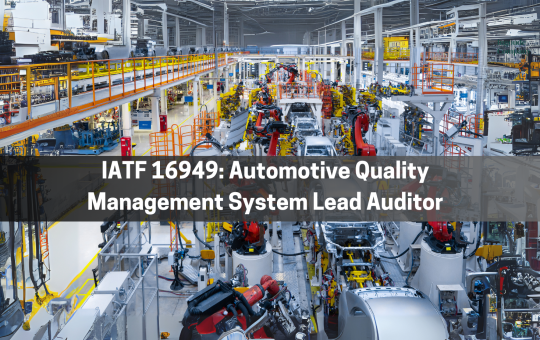
AS9100 Aerospace Quality Management System Lead Auditor
- Industry-Specific Expertise: Gain in-depth knowledge of quality management tailored to the aerospace sector.
- Global Recognition: Earn a certification that is recognized and valued across the aerospace industry.
- Career Advancement: Unlock opportunities for roles in quality assurance, auditing, and compliance in the aerospace industry.
- Practical Skills: Master the tools and techniques required for conducting effective audits and driving continual improvement.
- Contribution to Safety and Quality: Play a crucial role in ensuring the highest standards in aerospace manufacturing and services.
- Understand the structure and requirements of the AS9100 standard and its integration with ISO 9001.
- Plan, conduct, and report audits of aerospace quality management systems.
- Identify gaps and recommend corrective actions to enhance compliance and performance.
- Lead audit teams effectively while adhering to ethical auditing principles.
- Evaluate and improve quality management processes specific to the aerospace sector.
- Introduction to AS9100 and Aerospace Quality Management
- Historical background and importance in the aerospace industry.
- Overview of the standard’s structure and its application.
- Requirements and Key Clauses of AS9100
- Integration with ISO 9001 and aerospace-specific additions.
- Focus areas: Product safety, counterfeit parts prevention, and risk management.
- Audit Process and Methodology
- Planning and conducting audits within the aerospace sector.
- Techniques for data collection, evaluation, and reporting.
- Role of a Lead Auditor
- Managing audit teams and maintaining ethical practices.
- Conflict resolution and decision-making in audits.
- Risk-Based Thinking and Continual Improvement
- Applying risk management principles in audits.
- Identifying opportunities for process improvement.
- Case Studies and Role-Playing
- Real-life examples of AS9100 audits.
- Group discussions and role-playing exercises.
- Advanced Certifications
- Pursue ISO 14001 or ISO 45001 Lead Auditor certifications to expand expertise into environmental or occupational health and safety management systems.
- Consultancy Roles
- Become an aerospace quality management consultant, assisting organizations in achieving and maintaining AS9100 certification.
- Leadership Positions
- Quality Manager or Quality Assurance Director in aerospace manufacturing or supply chain organizations.
- Specialized Roles in Risk Management
- Focus on risk analysis and mitigation strategies within aerospace quality systems.
- Professional Development
- Join industry associations like the International Aerospace Quality Group (IAQG) to network and stay updated on best practices.
- Broaden Expertise
- Gain further skills in Six Sigma or Lean methodologies for process improvement in aerospace industries.
- Experienced Trainers: Learn from industry professionals with hands-on experience in aerospace quality and auditing.
- Comprehensive Materials: Access the latest resources, including case studies and audit templates, tailored to the aerospace sector.
- Recognized Certification: Receive a globally acknowledged certification upon successful completion of the course.
- Practical Approach: Engage in real-world exercises and role-playing to prepare for professional audits.
- Dedicated Support: Benefit from ongoing guidance and resources to excel in your auditing career.
Study Units
- Introduction to AS9100
- Overview of AS9100 and its importance in the aerospace industry.
- Integration with ISO 9001 and key additional requirements.
- Auditor Roles and Responsibilities
- Key competencies and ethical practices for Lead Auditors.
- Planning, conducting, and managing audits.
- Understanding AS9100 Requirements
- Detailed analysis of AS9100 clauses and their application in aerospace.
- Risk-based thinking and its role in quality management systems.
- Audit Planning and Execution
- Developing risk-based audit plans and defining objectives.
- Gathering evidence, interviewing personnel, and reviewing documents.
- Non-Conformities and Corrective Actions
- Identifying and categorizing non-conformities.
- Recommending and verifying the implementation of corrective actions.
- Audit Reporting and Follow-Up
- Writing clear and comprehensive audit reports.
- Communicating findings to stakeholders and management.
- Certification and Continuous Improvement
- Steps to achieve AS9100 certification.
- Strategies for maintaining compliance and driving continual improvement.
- Practical Exercises and Case Studies
- Hands-on activities to simulate real-world audit scenarios.
- Case studies focusing on common challenges in aerospace quality audits.
Upon successful completion of the AS9100 Lead Auditor course, participants will be able to demonstrate the following professional competencies:
Audit Leadership:
Plan, lead, and conduct AS9100 audits in compliance with ISO 19011 and IAQG auditing guidelines.Aerospace Quality Expertise:
Interpret and apply AS9100 requirements within complex aerospace manufacturing and maintenance environments.Risk-Based Thinking:
Evaluate risk management practices including product safety, counterfeit parts prevention, and operational reliability.Compliance Verification:
Assess conformity with AS9100 clauses, ISO 9001 requirements, and aviation-specific regulatory obligations.Non-Conformity Analysis:
Identify process deficiencies, perform root cause analysis, and recommend effective corrective and preventive actions.Audit Reporting and Presentation:
Develop precise and comprehensive audit reports, effectively communicating findings and improvement opportunities to management.Team Management:
Lead audit teams efficiently, maintain professional ethics, and coordinate stakeholder engagement during audits.Continuous Improvement Facilitation:
Promote and monitor ongoing enhancements in aerospace quality management systems.Integration Capability:
Understand how AS9100 integrates with ISO 9001, ISO 14001, and ISO 45001 standards for a holistic management system approach.
This course is ideal for professionals working within or supporting the aerospace, defense, and aviation industries who are responsible for ensuring quality, compliance, and continual improvement. It is specifically designed for:
Quality Managers and Engineers: Seeking to deepen their understanding of AS9100 standards and lead audits in aerospace environments.
Internal and External Auditors: Aiming to become certified Lead Auditors for AS9100-compliant organizations.
Production and Operations Managers: Focused on maintaining consistent quality, safety, and regulatory compliance in manufacturing.
Supply Chain and Procurement Professionals: Managing supplier quality and compliance within aerospace supply networks.
Regulatory and Compliance Officers: Overseeing adherence to aerospace industry standards and contractual requirements.
Consultants and Quality Advisors: Assisting organizations in achieving or maintaining AS9100 certification.
Professionals Seeking Career Advancement: Aspiring to leadership or specialist roles in aerospace quality assurance, auditing, and risk management.
Our assessment process is designed to ensure every learner achieves the required level of knowledge, skills, and understanding outlined in each course unit.
Purpose of Assessment
Assessment helps measure how well a learner has met the learning outcomes. It ensures consistency, quality, and fairness across all learners.
What Learners Need to Do
Learners must provide clear evidence that shows they have met all the learning outcomes and assessment criteria for each unit. This evidence can take different forms depending on the course and type of learning.
Types of Acceptable Evidence
Assignments, reports, or projects
Worksheets or written tasks
Portfolios of practical work
Answers to oral or written questions
Test or exam papers
Understanding the Structure
Learning outcomes explain what learners should know, understand, or be able to do.
Assessment criteria set the standard learners must meet to achieve each learning outcome.
Assessment Guidelines
All assessment must be authentic, current, and relevant to the unit.
Evidence must match each assessment criterion clearly.
Plagiarism or copied work is not accepted.
All learners must complete assessments within the given timelines.
Where applicable, assessments may be reviewed or verified by internal or external quality assurers.
Full learning outcomes and assessment criteria for each qualification are available from page 8 of the course handbook.
Top Courses
No results found.
Related Courses
Let's Get in touch
Deleting Course Review
Course Access
This course is password protected. To access it please enter your password below:

